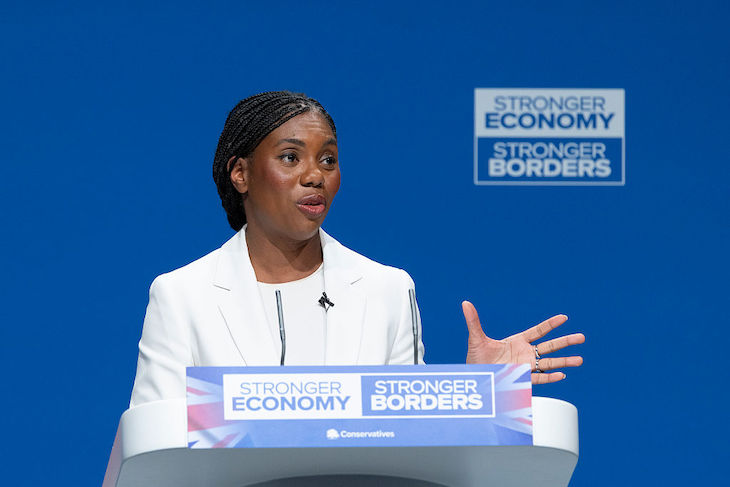Kemi Badenoch’s announcement that the Conservatives are now irrevocably committed to pulling out of the European Convention on Human Rights (ECHR) surprised no-one. It was nevertheless nicely done, and showed that here at least the Tory leader is playing a bad hand rather well.
The Tories have now stolen a march on Nigel Farage
For one thing, this is patently the right decision for the UK. The baneful effects of scrupulous adherence to the ECHR have been apparent for some years. Migration is a straightforward example. The ever-widening Strasbourg interpretation of Articles 3 and 8, protecting freedom from torture and family life, which we then have to apply loyally, often makes securing our borders against those we do not want here nearly impossible. But it’s not the only example. Our treatment of criminals, the protection of our soldiers from vengeful prosecutions arising out of events decades ago, and our ability to prefer our own citizens to others for state support or pass laws on hot-button topics such as abortion are also seriously constrained.
Badenoch has also realised something else: whatever a few older grandees may say on human rights scepticism, politically the Tories now have no choice but to embrace it. Forget the chattering of the urban lanyard classes: what matters is the sceptical just-about-managing from Cardiff to Clacton to Cambuslang. These are the people that the Tories desperately need to detach from Labour and Reform, and who increasingly see the ECHR as an irrelevance which must be ditched if necessary to deal with matters they do care about – like migration. With Reform already committed unequivocally to ECHR exit, any Tory dithering would simply have reinforced the idea that for all their fine words the Conservatives had learnt nothing from 2024 and were still little more than Starmer 2.0.
Indeed, in one way the Tories have now stolen a march on Nigel Farage. Although Reform’s no-ifs, no-buts commitment to get rid of the ECHR has gone down remarkably well, it remains seriously vulnerable in one respect. As Badenoch pointed out in a well-directed shot during her speech at Tory conference, Reform go in very much for announcements without a plan behind them. Farage’s ECHR programme is a typical example. It is a simple policy of withdrawal, unbacked by any serious detail or argument about how it is to be done or the difficulties it might encounter.
Badenoch has neatly sidestepped this trap. As long ago as last June, having hinted that she might be open to finally abandoning the Strasbourg human rights arrangements, she immediately and very publicly commissioned a detailed report from Lord Wolfson, the shadow Attorney General and a very shrewd lawyer, on whether it was practicable and if it was, how to do it. This landed on her desk a few days ago. True, it was pretty much a foregone conclusion that Lord Wolfson would back leaving. Nevertheless his lengthy opinion, weighing in at nearly 200 pages, is an enormous advantage. Not only does it arms the Tories with useful chapter and verse on what is wrong with the Convention: it also demolishes a number of stock objections to ECHR exit, such as that withdrawal is now impossible because of the Good Friday Agreement.
Nor is this the sole intellectual back-up for the new Tory view. In July this year, Suella Braverman produced a public paper under the auspices of the Prosperity Institute in London, supported informally by numerous senior Tories (including one suspects Badenoch), which not only reiterated many of the reasons appearing in Lord Wolfson’s report but laid out a framework for any necessary legislation. It is an open secret that a number of sympathetic lawyers are already drafting possible legislation, a task of surprising complexity. Hence if and when a Tory government is elected that is committed to withdrawal, it will be able to get to work immediately.
Could this start the revival of Tory fortunes? It’s a matter of wait and see. Two big obstacles face the party. One is that, however well and logically its leader puts her her case, the polls show that for the moment at least people still don’t trust the Tories to deliver on anything.
The other problem is, ironically, Reform. Producing a properly backed-up plan for ECHR withdrawal undoubtedly shows up the essential emptiness of Reform’s promises: but it equally hands Reform a chance to close the gap. There is no copyright in political programmes. If Nigel Farage has any political sense, he will right now now be leafing through the arguments dreamt up by the Conservatives with a view to producing not only a popular policy but also for once the arguments to back it up.
Playing a bad hand well is an impressive feat. But Badenoch will be painfully aware that without a good dose of luck you’re still uncomfortably apt to lose. For the moment her fingers, one suspects, remain firmly crossed.







Comments